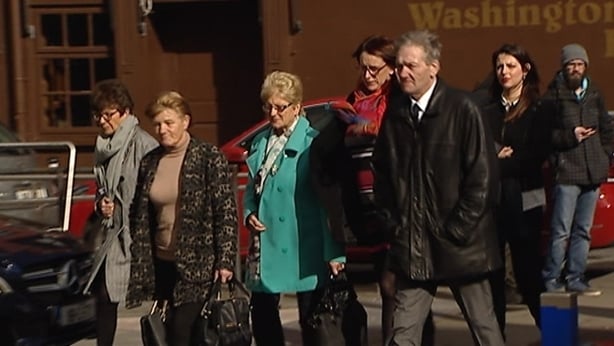The family of a woman who failed to regain consciousness after a routine neck operation and died 22 months later have called on Cork University Hospital to review their protocols around disc removal surgery.
Patricia Kelly's family said they hoped lessons would be learned after the jury at her inquest today returned an open verdict.
45-year-old Mrs Kelly died in December 2015 after lapsing into a coma following a routine disc operation which her surgeon described as 'uneventful'.
The married mother-of-one, from Castletreasure, Douglas, in Cork city, had diabetes, hypertension and a BMI of 42.
She was admitted to Cork University Hospital on 11 February 2014 for urgent elective disc surgery and expected to go home later that day. But she remained in a coma until her death in December 2015.
Cork City Coroner Philip Comyn suggested the jury might like to call on the hospital's multi-disciplinary medical team to review a number of their protocols, but the jury choose not to make any such recommendation, and returned an open verdict.
He extended his sympathies to Mrs Kelly's family.
Mr Comyn said this had been a very difficult case and even with the extensive evidence it was hard to come up with a conclusive answer as to the cause of death which is what the family had hoped for.
He noted staff from CUH had attended the inquest and remarked that Mrs Kelly's death had taken a toll on everyone.
The coroner suggested to the personnel from CUH that they might consider carefully the issues that were identified at the inquest and this might be helpful in the future.
Earlier today, the inquest heard details of a report carried out by Consultant Neurosurgeon Mr Donnacha O'Brien on behalf of the coroner.
In it, Mr O'Brien, who works at Beaumont and Temple Street Children's hospitals, was highly critical of CUH's own internal review into Mrs Kelly's death.
He was also critical of the fact that Mrs Kelly was allowed to take her blood pressure medication before the operation, and that an arterial line was not used to monitor her blood pressure during the operation.

He said he would not have operated on Mrs Kelly with her medical history and BMI of 42 without a cardiologist's report.
Mr O'Brien said the effect of taking the blood pressure medication was to exaggerate the impact of the anaesthetic and while doctors at CUH were of the view that this was not an issue in this case, his view is that if you give it, you have to be well armed to deal with it.
"If you don't have an arterial line in, you won't be able to react quick enough".
Yesterday, the inquest heard how the protocol for patients taking ACE-inhibitors - medication to treat high blood pressure - varies from hospital to hospital. At CUH, they do not instruct patients to stop taking it before an operation.
Consultant Anaesthetist Dr Frank Loughnane said there is broad disagreement in medical communities as to whether they should or should not be taken prior to surgery but at CUH it was not discontinued.
Assistant State Pathologist Dr Margot Bolster called it a "most complex case".
The cause of death she found was a prolonged coma, due to severe hypoxic injury to the brain during an operation on her neck, complicated by bronchitis pneumonia.
Speaking afterwards, the Kelly family said they had mixed emotions about the verdict. There are still questions they need answered but they are happy the inquest finally went ahead and glad they had a voice and that it was heard.
Mrs Kelly's niece, Michelle Sullivan said they hoped that the CUH would take on board the coroner's appeal and consider the issues raised during the two-day hearing.
Mrs Kelly's husband John said that from day one all they wanted to find out is what had happened to his wife. He said he hoped no other family would go through the pain and suffering both families have gone through.







